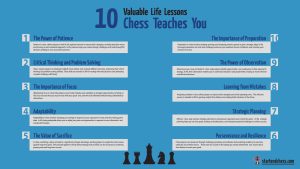10 Valuable Life Lessons Chess Teaches You: Strategies for Success
Chess is more than just a game; it’s a powerful tool for personal development and growth. The life lessons chess teaches extend far beyond the board, offering valuable strategies that can be applied to various aspects of life. Whether you’re looking to improve your decision-making skills, enhance your ability to focus, or develop greater resilience, the principles of chess can guide you toward success.
In this article, we’ll explore 10 valuable life lessons chess offers, each providing insights that can help you navigate challenges and achieve your goals. By understanding and applying these lessons, you’ll not only become a better chess player but also cultivate the skills needed to excel in your personal and professional life. Discover how the game of kings can empower you with strategies for lasting success.

-
The Power of Patience
Patience in chess probably is one of the most important attributes towards successful playing. It all deals with waiting for a good time to act instead of rushing into action. This attribute helps the player to hold from making impulsive decisions and allows consideration of the consequences that each move will bring about. In games, this translates into patience when waiting for your opponent’s mistake or development of an opportunity. This can be termed as strategic patience, which can make all the difference between winning and losing, since you are not acting in haste but are carrying out a well-thought-out plan.
This chess principle is just like the power of patience in life. Patience is what gets one through the most difficult periods, whether in career transition, building up relationships, or working out personal goals, to wait for proper timing. You get a chance to stand firm so that you won’t make hasty decisions that you may regret later on. Being more patient can help in making better approaches toward challenges with clear thoughtfulness and in making current choices in line with your long-term objectives.
Strategy for Success: Practice mindfulness and avoid making hasty decisions. Take time to consider all options before acting.
-
Critical Thinking and Problem-Solving
The most crucial aspects of strategy in playing chess are Critical Thinking and Problem-Solving. The players always need to think one step ahead of their opponent, develop counter-strategies, and constantly reassess their evaluation of the position on the board. This means having several possibilities in mind, then forecasting what could happen depending on how certain things unfold, all based on logical choices and not just intuition. Strong problem-solving in chess entails simplifying complex positions into simpler ones and understanding the ways different parts of a position interact.
The same critical thinking and problem-solving skills apply to everyday life. Critical thinking allows you to approach a problem in a systematic way, explore different solutions, and extrapolate the consequences of decisions. Problem-solving may be dealing with professional conflict or planning your personal projects. In developing these skills through chess, a structured method of problem-solving is applied, which extends into other situations and enhances decision-making and the ability to overcome adversities.
Strategy for Success: Break down complex problems into smaller, manageable parts, and think several steps ahead before taking action.
-
The Importance of Focus
Most of the time in chess, great deals of focus are needed, for even the shortest moment of a lapse in attention can lead to a big disadvantage. Every move that is played and how those moves will favor their strategy must be observed by every player. It is by this sharp observation that they can promptly take hold of opportunities to tactically gain from plays, as well as evade traps and mistakes that may give away the game. Maintaining focus also facilitates long-term planning and adjustment to strategies being utilized by one’s opponent.
The power of focus in life can be extended to being present and attentive in whatever one is doing. The fact that one is focused, be it on working on a project, having a conversation, or trying to achieve something for oneself-you get to carry out tasks on hand more quickly and effectively. It reduces the chances of messing up on things and sets them right on track. You will be able to enhance your productivity and also attain desired results in professional and personal lives through focus.
Strategy for Success: Set clear, specific goals and eliminate distractions that divert your attention from achieving them.

For in-depth articles and resources on chess therapy and education, visit [startend chess]
-
Adaptability
Flexibility in a game of chess means immediately changing your strategy in view of the dynamics that are constantly changing in the game. Every move that your opponent plays calls for revising your plans and countering his tactic. It is such flexibility that turns disadvantages into advantages and makes you prepared for any eventualities. Adaptability also includes learning from each game and adjusting your approach based on what you encounter.
Adaptability in life is equally important, as it helps an individual move through change and uncertainty with success. Whether it’s a shift in the work environment, altered personal circumstances, or any unexpected challenges, adaptability allows one to adjust plans and strategies to meet particular situations. Embracing change and remaining flexible in approach might also lead to resilient problem-solving and seizing new opportunities as they arise.
Strategy for Success: Embrace change and be willing to revise your plans as needed. Flexibility is key to overcoming challenges.
-
The Value of Sacrifice
In chess, sacrifice means giving up a piece, which would give one more good. Losing a piece or a position might open up attacking resources against the opponent’s king or create a positional advantage. A chess player knows that when short-term losses are worth undertaking if the potential long-term gain or an overwhelming victory would result.
Likewise, in life, there comes a stage where one has to make certain sacrifices for higher ends. This might be an immediate comfort or opportunities that are being sacrificed for eventual success or growth. Recognizing such a sacrifice gives you the cue of making decisions that strategically align with your ultimate objectives-be it taking out quality time for education, sacrificing some leisure for career advancement, or letting go of transient pleasures for the sake of important relationships.
Strategy for Success: Evaluate what is most important in the long run, and be willing to make sacrifices to achieve your ultimate goals.
-
Perseverance and Resilience
Chess games require players to be put in some uncomfortable positions and have them find a means of wriggling themselves out. In summary, the ability to persist despite difficulties and always keep one’s head above water is very important for games to be turned around in favor. Resilience helps in putting aside mistakes, regrouping, and moving forward with the struggle for a win when the chances seem hopeless.
These attributes help an individual in real life to overcome and survive adversities. It allows you to pursue goals with maximum strength, though battered, and resilience lifts you up from failure and adaptability in adversity. The acquisition of these qualities through chess can assure you that you have developed a strong and resolute mindset for your personal and professional growth in the long run.
Strategy for Success: Cultivate resilience by viewing setbacks as learning opportunities rather than failures. Keep pushing forward, even when the path is difficult.
-
Strategic Planning
In other words, strategy formulation in chess means having several moves in your head, logically and consistently built to achieve your aim. In following such a line, you have to be very conscious not only of your position but also of what can be done by the opponent. A developed strategy is actually all about controlling the board, setting up tactics, and bringing those plans into reality.
In life, strategic planning holds the key to success in order to handle or manage every aspect of personal and professional life. Clarity regarding your goals, actionable plans, and anticipation of obstacles will characterize truly effective strategic planning. Applying chess principles of strategic foresight and preparation will enable you to negotiate complex situations and work toward your objectives with great clarity and purpose.
Strategy for Success: Develop a detailed plan for achieving your goals, and regularly review and adjust it as needed.

-
Learning from Mistakes
Learning from mistakes in chess means going over games that have gone awry and deducing where one went wrong and how one is to improve on. With each mistake, an opportunity for growth avails itself in that with a mistake, one will find that there are better ways or means by which such errors could have been overcome. This reflective process will also enable the refining of skills so as to prevent the repetition of the same type of mistake.
Equally important in daily life, lessons from mistakes apply to personal and professional development. If you learn how to reflect upon your failures and mistakes, you will derive from them valuable lessons that may lead you to at least informed improvements. Viewing mistakes as learning opportunities rather than setbacks fosters a growth mindset, thereby further enhancing your capability to adapt to and succeed in future efforts.
Strategy for Success: Reflect on your mistakes, identify what led to them, and use this knowledge to make better decisions in the future.
-
The Power of Observation
The art of observation in chess is keeping a close watch on the board and the moves of one’s opponent to guess his strategy. Accurate observation may reveal a small pattern, weakness, or good opportunity that might otherwise be missed. Observation thus helps players in taking appropriate decisions by what their opponent is doing.
In fact, being observant in life pays tremendous dividends when it comes to reading people, situations, and trends. Observing the details and catching the cues will help you improve your decision-making, communicate better, and open up opportunities. A keen sense of observation thus helps you to sail through tricky situations and lets you gain insights that help in the overall success.
Strategy for Success: Practice active listening and pay attention to details. Observation can lead to opportunities that others may overlook.
-
The Importance of Preparation
Preparation is among the key building blocks to winning in chess. Proper planning and training for a match are crucial ingredients towards success. A well-trained chess player reads through openings, studies past games, and researches what the opponent is likely to use during the match. This enables him to make informed moves and take on different eventualities with a lot of confidence. Indeed, the work put into preparation offers great room for improvement in performance and strategic leverage with minimal possibility of committing blunders during play.
Everything in life, including career building and personal projects, requires preparation. Preparation for a task-be it a job interview, a big presentation, or a big change in life-equips you with the essential knowledge and competence to tackle the situation effectively. In that sense, by investing your time in preparing yourself, you will be ready for the challenges and opportunities that come along. Being proactive helps to develop your confidence and bring you closer to achieving your objectives and being the best in whatever you do.
Strategy for Success: Invest time in preparation and continuous learning. The more prepared you are, the more confident and successful you will be.

Conclusion
Chess is not just a pastime; it’s a profound learning experience that can shape your approach to life. The life lessons chess imparts—such as patience, strategic thinking, and adaptability—are tools that can help you tackle challenges and seize opportunities in every aspect of your journey. By integrating these lessons into your daily routine, you’ll find that the skills honed on the chessboard are directly transferable to real-life situations, enabling you to navigate complexities with confidence and clarity.
As you continue to play and study the game, remember that every move is a chance to refine not just your chess strategy but also your life strategy. Embrace the game as a metaphor for life’s challenges, and let the valuable life lessons chess offers guide you toward personal and professional success. The insights you gain from chess can be your blueprint for achieving your goals and becoming the best version of yourself.
We’ve prepared a podcast to accompany this article, offering the same insights in an audio format. If you enjoy listening, give it a play:
References:
- Sala, P., Gobet, F., Trinchero, R., & Ventura, M. (2017). “The impact of chess instruction on the academic achievement of children: A meta-analysis.” Educational Research Review, 22, 65-82.
- Burgoyne, A. P., et al. (2019). “Chess and cognitive skills: Evidence from a randomized controlled trial.” Educational Psychology, 39(1), 82-95.
- Miller, E. (2014). “The Effects of Chess Instruction on the Academic Performance of Students.” International Journal of Instruction, 7(1), 117-136.
- Berg, K. A., & Wendel, J. (2018). “Chess and the Brain: How Playing Chess Can Improve Cognitive Skills.” Neuroscience & Biobehavioral Reviews, 92, 162-173.
- Duncan, T. E., et al. (2020). “Mindfulness and Chess: An Investigation of a Game’s Potential to Enhance Mental Health.” Mindfulness, 11(3), 641-650.
- McPherson, S. (2010). “Chess and Cognitive Function: A Review of the Literature.” Psychological Science, 24(5), 855-860.
- Bialystok, E. (2018). “Bilingualism and Cognitive Development: A Review.” Journal of Cognitive Psychology, 30(1), 24-33.



0 Comments